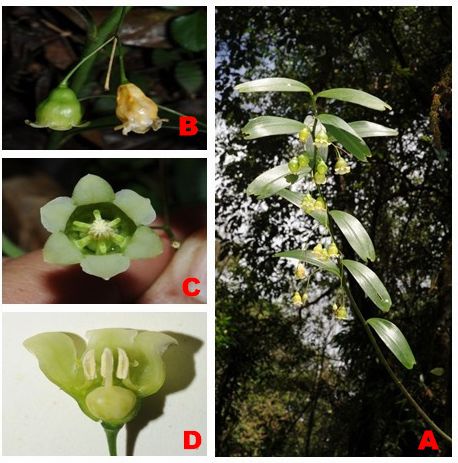Name:HU Guangwan
Tell:
Email:guangwanhu@wbgcas.cn
Organization:Wuhan Botanical Garden
A New Rare Species of Polygonatum Discovered in Yunnan
2015-12-02
Polygonatum Mill., a genus of Asparagaceae, is famous for its extraordinary medical value. Up to now, the genus contains over 60 species, and 41 species have been reported in China. The important traditional Chinese medicines, including rhizoma polygonati and Yuzhu, are rhizome of Ploygonatum, performing the pharmacology function of boosting qi and nourishing yin. Generally, rhizoma polygonati, refers to P. kingianum Coll. et Hemsl., P. sibiricum Red., and P. cyrtonema Hua. Likewise, we refer to P. odoratum(Mill.)Druce as Yuzhu. At the same time, the other species of this genus, are commonly used as substitution of rhizoma polygonati and Yuzhu or folk medicines.
Prof. HU Guangwan, current curator of the Herbarium of Wuhan Botanical Garden, initially found an unusual kind of Polygonatum in a virgin forest of Yingjiang County, southwestern Yunnan, in 2011. Unlike the most of species of this genus, it grows with many mosses and ferns, attaching to trunk of large tree.
Peduncle pendulous, basal nearly 1cm adnate to stem, which enables the attachment site of peduncle keep away from axil, presenting typical phenomenon of “new problems complicate an issue”. Pendulous yellowish-green flowers campanulate, which apparently distinguishes from other species. Weirder still, on the apex of each six filaments, there is a 2mm long spur. All the six spur perpendicular to anther, thus forming a unique radial structure.
After detailed comparison with representative collections, and consulting relevant literature, the species was confirmed to be new to science. Under the cooperation with Dr. CAI Xiuzhen, from Hunan Normal University, description of this new species was published in Phytotaxa entitled “Polygonatum campanulatum(Asparagaceae), a new species from Yunnan, China”.
Given the unique flower shape, such as campanulate perianth, which apparently different from other species, Prof. Hu named it as P. campanulatum G.W.Hu. This species was only found in a virgin forest, with a rare amount. According to IUCN’s evaluation criterion, it was ranked as critically endangered situation. To prevent it from extinction in the wild, it is urgently needed to conduct relevant conservation researches.
The holotype of the new species was deposited at the herbarium of Wuhan Botanical Garden, CAS (HIB). One of isotypes was deposited in herbarium of Hunan Normal University (HNNU), the others were stored at HIB. So far, HIB is added a new precious holotype once again.

(A)The flower characters of P. campanulatum G. W. Hu ; (B,C, D) The flower characters of P. campanulatum G. W. Hu (Image plotted by HU Guangwan)